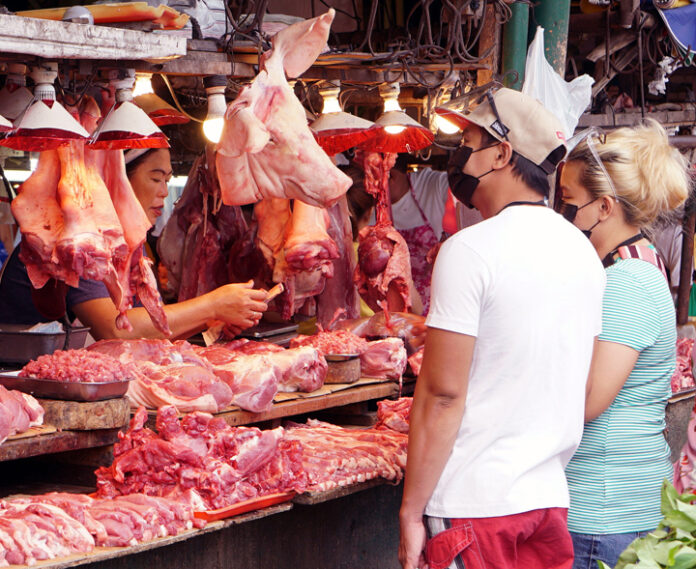
SEN. Panfilo Lacson, taking up the cudgels for over 80,000 Filipino businessmen and workers relying on the local hog industry, asked President Duterte on Monday to take back his Executive Order 128 lowering the tariff on imported pork even as government moved to raise the limit on pork importations.
In a marathon hearing that several senators attended in person, the lawmakers also grilled Department of Agriculture (DA) officials on the basis for their twin recommendations—later endorsed by Cabinet-level committees to the President—to reduce tariffs and expand imports in order to stabilize supply and prices, over warnings from many sectors that this would compound the woes of local hog producers already ravaged by the African Swine Fever (ASF).
The warnings of the impending collapse of the local hog sector, earlier estimated at worth P300 billion, were repeated by resource persons from the producers, namely, Rosendo So of the Samahang Industriya ng Agrikultura (Sinag) and Nicanor Briones of the Pork Producers Federation of the Philippines, Inc.
This, after the chairman of the Agriculture committee, Sen. Cynthia Villar, expressed serious misgivings over the basis for the huge volume—400,000 metric tons of pork to be allowed in under the minimum access volume (MAV), and sought an explanation from Agriculture Secretary William Dar.
Presiding over the Committee of Whole hearing on food security on Monday, Senate President Vicente Sotto III wondered aloud, “why lower the tariff? Sa bulsa punta nyan [That will just line their pockets].” He was apparently referring to the huge profits that traders have already been getting from their big markup on their imports; as well as allegations raised by Lacson of a possible “tongpats” [kickback] system in the grant of import quotas.
“It is mind-boggling. How were they able to convince the President to bring down tariff despite the backlash? Were the industry consulted?” the Senate leader asked.
Villar asked Dar to explain why he recommended 400,000 metric tons for MAV, when he knew very well that only 20-30 percent of pork imports are “good meat” and the rest are offals, used widely by meat processors.
Senate Minority Leader Frank Drilon was also skeptical of the import volume increase from 100,000 metric tons to 400,000 metric tons, noting that Secretary Dar had previously endorsed 54,000 minimum access volume.
Secretary Dar told senators the matter was taken up by the Cabinet and the final recommendation to the Tariff Commission.
Sotto also cited reports that “at least 847 sanitary phytosanitary import clearance (SPS-IC) were issued to non-existent” trading companies, even as probers were asked to look into “questionable backgrounds of pork importers granted SPS-IC permits.”
This, as senators were told at least 60 importer companies were linked to spurious permits using a “modus including tampered permits to consignees” covering shipments for delivery.
All intel, no arrests?
Meanwhile, Senator Richard Gordon, whose Blue Ribbon committee had earlier investigated smuggling of food items, griped that authorities have yet to nab those involved in the racket. “Puro [Purely] intelligence gathering but no arrests. Kunyari may nahuli [You pretend someone was arrested] but case not closed.”
Lacson likened the Palace’s Executive Order 128 to a “merciless killing of the local hog industry” that will render hog traders “double dead.”
Lacson lamented that the local hog industry is on the verge of death as imported pork floods the markets, even as government revenue suffers from the tariff reductions.
Pork holiday
At the start of the Committee of the Whole hearing Monday, Senator Joel Villanueva reported to the panel that a “pork holiday” was widely felt in the markets.
Reporting his findings, the senator recounted in Filipino: “The effect was felt up to the carinderias and the household table. This issue is really close to the stomach of Filipinos.”
Underscoring the urgency of the related food-security issues that prompted the COW hearings, Villanueva asserted that “once a crisis hits prices and food supply, Filipinos know the accountability is on the government.”
The senator added: “First, we want to know if there was negligence that triggered skyrocketing prices of pork amid the outbreak of the African swine fever [ASF].”
He recalled that “way back July 2019, even before Covid-19, we were already hit by African Swine Fever in our piggeries.”
Still, ASF spread out in 40 provinces in the region.
Villanueva said the second reason for the crisis to flare was “neglect.” He recalled that, since 2018, officials of the Bureau of Animal Industry (BAI) allowed the entry of imported pork from countries previously banned in the Philippines because they had ASF outbreaks.
But, he also acknowledged the “bigger tragedy” when some businessmen made noise that the only solution to the supply problem triggered by the ASF onslaught on local farms was simply to “import pork.”
He stressed the need to find alternative solutions, including their suggestion to reconsider EO 128. “Government must lay down concrete plans. We need real aid that will help save our local pork industry,” he said in Filipino.
Image credits: PNA/Ben Briones
Read full article on BusinessMirror
